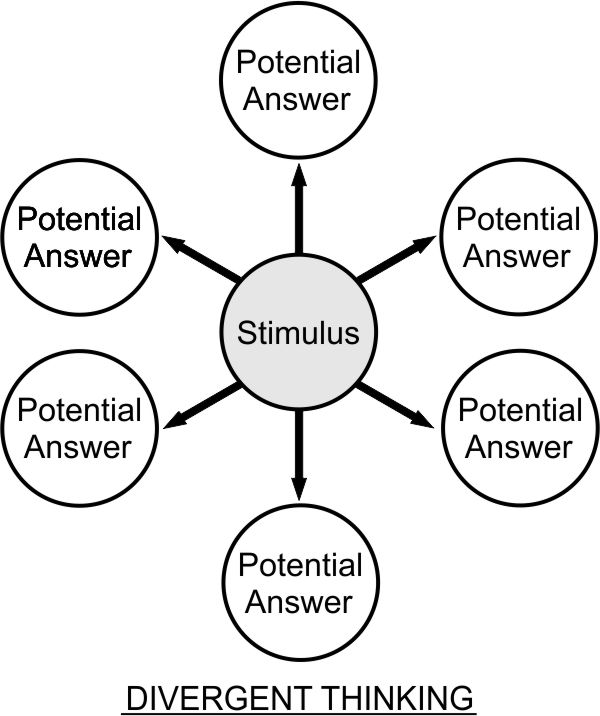|
Divergent Association Test (DAT)
The Divergent Association Task (DAT), published in July 2021, is a psychological test designed to measure a person's creativity. The task involves naming ten nouns that differ as much as possible from each other. Here, the difference between two terms is understood in the semantic sense and is calculated by a special algorithm. The test specifically measures a component of creativity called divergent thinking Divergent thinking is a thought process used to generate creative ideas by exploring many possible solutions. It typically occurs in a spontaneous, free-flowing, "non-linear" manner, such that many ideas are generated in an emergent cognitive fa ..., which is the ability to find different solutions to open-ended problems. There is an online version of the task created by the authors who developed the DAT (Jay A. Olson, Johnny Nahas, Denis Chmoulevitch, Simon J. Cropper, Margaret E. Webb). References Further reading * * * * * * {{cite journal , last1=Zeng , fir ... [...More Info...] [...Related Items...] OR: [Wikipedia] [Google] [Baidu] |
Creativity
Creativity is the ability to form novel and valuable Idea, ideas or works using one's imagination. Products of creativity may be intangible (e.g. an idea, scientific theory, Literature, literary work, musical composition, or joke), or a physical object (e.g. an invention, dish or meal, piece of Jewellery, jewelry, costume, a painting). Creativity may also describe the ability to find Creative problem-solving, new solutions to problems, or new methods to accomplish a goal. Therefore, creativity enables people to Solves problem, solve problems in new ways. Most ancient cultures (including Ancient Greece, History of China#Ancient China, Ancient China, and Outline of ancient India, Ancient India) lacked the concept of creativity, seeing art as a form of discovery rather than a form of creation. In the Judeo-Christian-Islamic tradition, creativity was seen as the sole province of God, and human creativity was considered an expression of God's work; the modern conception of creativi ... [...More Info...] [...Related Items...] OR: [Wikipedia] [Google] [Baidu] |
Semantics
Semantics is the study of linguistic Meaning (philosophy), meaning. It examines what meaning is, how words get their meaning, and how the meaning of a complex expression depends on its parts. Part of this process involves the distinction between sense and reference. Sense is given by the ideas and concepts associated with an expression while reference is the object to which an expression points. Semantics contrasts with syntax, which studies the rules that dictate how to create grammatically correct sentences, and pragmatics, which investigates how people use language in communication. Lexical semantics is the branch of semantics that studies word meaning. It examines whether words have one or several meanings and in what lexical relations they stand to one another. Phrasal semantics studies the meaning of sentences by exploring the phenomenon of compositionality or how new meanings can be created by arranging words. Formal semantics (natural language), Formal semantics relies o ... [...More Info...] [...Related Items...] OR: [Wikipedia] [Google] [Baidu] |
Divergent Thinking
Divergent thinking is a thought process used to generate creative ideas by exploring many possible solutions. It typically occurs in a spontaneous, free-flowing, "non-linear" manner, such that many ideas are generated in an emergent cognitive fashion. Many possible solutions are explored in a short amount of time, and unexpected connections are drawn. Divergent thinking is often contrasted with convergent thinking. Convergent thinking is the opposite of divergent thinking as it organizes and structures ideas and information, which follows a particular set of logical steps to arrive at one solution, which in some cases is a "correct" solution. The psychologist J. P. Guilford first coined the terms ''convergent thinking'' and ''divergent thinking'' in 1956. Activities Activities which promote divergent thinking include creating lists of questions, setting aside time for thinking and meditation, brainstorming, subject mapping, bubble mapping, keeping a journal, playing table ... [...More Info...] [...Related Items...] OR: [Wikipedia] [Google] [Baidu] |
Psychological Tests And Scales
Psychology is the scientific study of mind and behavior. Its subject matter includes the behavior of humans and nonhumans, both consciousness, conscious and Unconscious mind, unconscious phenomena, and mental processes such as thoughts, feelings, and motivation, motives. Psychology is an academic discipline of immense scope, crossing the boundaries between the Natural science, natural and social sciences. Biological psychologists seek an understanding of the Emergence, emergent properties of brains, linking the discipline to neuroscience. As social scientists, psychologists aim to understand the behavior of individuals and groups.Hockenbury & Hockenbury. Psychology. Worth Publishers, 2010. A professional practitioner or researcher involved in the discipline is called a psychologist. Some psychologists can also be classified as Behavioural sciences, behavioral or Cognitive science, cognitive scientists. Some psychologists attempt to understand the role of mental functions in i ... [...More Info...] [...Related Items...] OR: [Wikipedia] [Google] [Baidu] |


